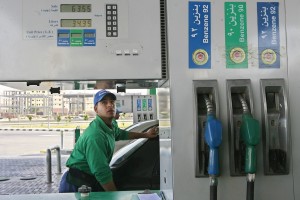
(AFP Photo)
The experimental operation of the second phase of government’s smartcard system was launched Sunday, distributing diesel and petrol in Mobil and Shell stations nationwide, according to Ministry of Petroleum statement.
The ministry added that 330 Mobil stations and 83 Shell stations have so far implemented the smartcard system.
Hamdy Abdel Aziz, head of the media office of Ministry of Petroleum explained that the abovementioned stations would be equipped with “emergency cards”, which will be used to experiment with the use of such smartcards ahead of their widespread distribution.
Undersecretary of Giza Supply Directorate Hefzy Sadek said that the experimental stage has yet to begin in Giza governorate.
Meanwhile, Egyptian General Petroleum Corporation (EGPC) Executive Chairman Tarek El-Molla, who inaugurated the programme’s second stage, was quoted in the statement as saying that this phase would be aimed at monitoring the process of distributing fuel from stations to cardholders.
El-Molla noted that within two weeks more stations will be added to the experimental phase.
Minister of Petroleum Sherif Ismail said earlier in October that the second stage would be effective within two or three months, after signing a protocol between the ministries of Interior and Finance to input the system into a database.
“As soon as the measures of the second stage of the programme are completed, only cardholders will be able to benefit from the programme,” Abdel Aziz stated.
El-Molla added that the second stage would be a continuation of the “successful implementation” of the first.
The first stage of the project saw the completion of automated trade between petroleum warehouses and fuel stations throughout the country, and ended in July.
Egypt is home to 2,646 fuel stations, 102 warehouses and 15 public relations companies currently connected to the smartcard system, according to El-Molla.
El-Molla stressed that the smartcard system is not specifying any amount of fuel to citizens, “and will be implemented with the same fuel prices,” he said.
The smartcard system would automate the nationwide distribution of diesel and gasoline while also helping the government address shortages and combat smuggling, according to Finance Minister Ahmed Galal.
The programme, which is overseen by the ministries of Petroleum and Finance, also aims to rein in subsidies for petroleum, which have increased three times over the last eight years, from EGP 40bn in 2005/2006 to EGP 120bn this year.
Interim Prime Minister Hazem El-Beblawi announced in November that the cutting of fuel subsidies would be implemented gradually over a period of five to seven years.
El-Beblawi added that the plan would not affect low-income citizens and would gradually decrease the subsidies on “those who can handle these cuts,” referring to upper-middle income earners, until the subsidised amount reaches the targeted citizens.
Ismail noted in October that if energy subsidies continued in their “current form”, they will represent a threat to development efforts and new investments. Total energy subsidies (petroleum and otherwise) currently stand at EGP 128bn.
The minister stressed that reducing subsidies would not mean changing petroleum products prices.



